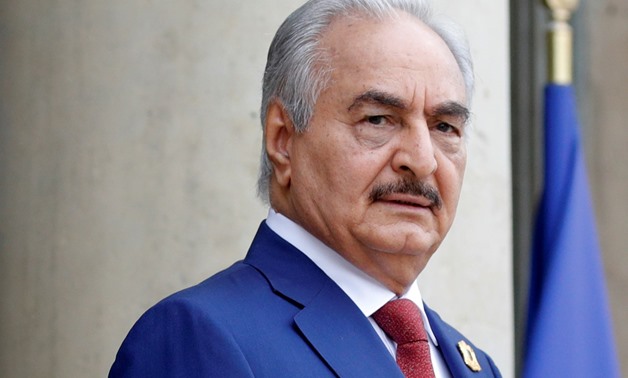
FILE PHOTO: Khalifa Haftar, the military commander who dominates eastern Libya, arrives to attend an international conference on Libya at the Elysee Palace in Paris, France, May 29, 2018. REUTERS/Philippe Wojazer/File Photo
CAIRO – 10 January 2020: Libyan National Army led by Khalifa Haftar on Thursday vowed to continue its offensive in the capital, Tripoli, against “terrorist” groups, apparently rejecting ceasefire calls by Russia and Turkey, Reuters reported.
In a statement, the army affirmed it was aware of the Russian calls aiming to seek “peace and stability” in the war-torn country, saying it welcomes them, but said they would not stop the army from fighting “terrorist groups” controlling Tripoli.
An unnamed advisor was later cited by AFP as saying that the LNA does not totally reject the ceasefire calls but said there were conditions that must be met.
Haftar on December 12th announced a “decisive” and “final battle” in Tripoli to “set it free” from armed militias. On January 6, 2020, the Libyan National Army forces seized the city of Sirte after attacking from five military axes to control several vital areas in the city such as Sirte port and Ghardabiya Airbase
In response to Haftar’s offensive, Turkey’s President Recep Tayyip Erdogan announced plans to send Turkish troops to fight along with forces of the so-called Government of National Accord (GNA), Haftar’s rival.
Despite wide condemnation, the Turkish parliament, on January 2, voted on Erdogan’s bill to send troops to Libya after Erdogan and head of Libya’s presidential council Fayez al-Sarraj reached a deal in February 2019 on drawing maritime borders in the Mediterranean Sea- one of the largest natural gas resources in the region- and on enhancing military cooperation.
The deal provoked anger in Egypt, Cyprus and Greece, which voiced their rejection of the deal as it contradicts with the international agreements.
Meanwhile, the Libyan Parliament held an emergency session, in which it voted on a bundle of decisions, including the rejection of the deals inked between Sarraj and Turkey.
The parliament voted unanimously on authorizing Haftar to disable airports, ports, and land gates that are controlled by the militias.
It further agreed to address the UN Security Council, the League of Arab States, the African Union, the European Union and other international organizations to withdraw the recognition of the GNA.

Comments
Leave a Comment